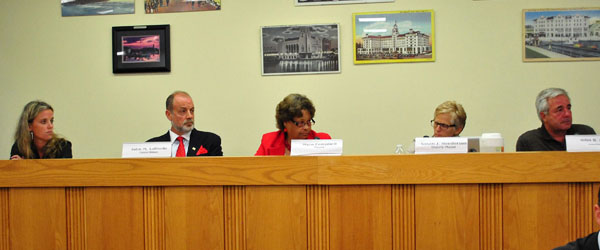Council splits on 5-year tax abatement vote
'The ordinance the way it is, is working'
A city ordinance that allows property owners to apply for tax abatements for improvements to existing structures and new construction passed is first reading.
At its meeting last week, the City Council voted 3-2 to extend the abatement, which was originally adopted over 10 years ago and renewed in 2008. Mayor Myra Campbell and Council members John Loffredo and Susan Henderson voted yes. Council members John Moor and Amy Quinn voted no.
“The ordinance the way it is, is working, and we need it as something that will spur business in the city,” said Loffredo.
“I find that anybody that knows anything about getting people to invest in the city is behind this,” Henderson said.
Henderson told the Sun she attended a League of Municipalities workshop led by state Director of Local Government Services Tom Neff that covered the importance of having an abatement program. Mayors from several different municipalities were in attendance, all of whom agreed tax abatement programs are a necessity to help grow the local economy, she said.
“Nobody wants to see property taxes go down more than me, I live on [Deal] Lake and I guarantee nobody sitting on the council is paying more taxes than me,” said Henderson. “Anyone who has any vision of the future of Asbury Park knows this is a way of driving up the economy.”
“The only thing we did was extend it,” said Campbell. “The abatement actually helps businesses come into the city. I didn’t see anything that was negative to keeping it as it stands. After talking to [City Redevelopment Attorney] Glenn [Scotland] and [Director of Planning and Redevelopment] Don [Sammet], they felt that it was a positive move.”
But Quinn and Moor contend that the abatements have mostly benefited developers, rather than homeowners, and that the developers would have built in the city regardless.
“It is an added burden to the taxpayers,” Quinn said in an email to the Sun. “When we examined who was taking advantage of the program, it wasn’t homeowners but developers who would have developed with or without the 5-year abatement. We have existing programs for homeowners including RCA money that can assist with housing upgrades.”
“I researched it, and to me there was no concrete evidence that over the past five years it encouraged people to do development in Asbury Park,” said Moor. “Thusly, the cost of this was passed on to every other taxpayer. Mr. Scotland made an excellent presentation on it and said we could make modifications to it. I was disappointed since it was voted through without any modifications made…”
Last year, the assessed value of abatements in the city totaled $2.4 million, according to Tax Assessor Erick Aguiar. The abatements were almost evenly split between commercial properties and condominium conversion projects, with “very few” abatements going to single family homes, Aguiar previously told the Sun.
Under the state’s 5-year abatement and exemption law, cities that qualify may adopt an ordinance to provide local property tax abatements or exemptions. The law allows the qualifying municipalities to offer diverse abatement and exemption options to improvements made to residential, commercial and industrial structures, with the end goal being to increase the ratable base.
At the Nov. 26 council meeting, Scotland and Sammet gave a presentation to the council on the council’s ability to select their own system of abatements. The current city council was not under any obligation to pass the ordinance as-is, rather, they could choose the exemptions and craft the ordinance to their liking based on the options, the two professionals said. The council discussed the matter at subsequent meetings, but tabled any vote on the measure until last week.
A public hearing on the ordinance will be required in the coming weeks before the measure gets put to a final vote.
Click here to access an article that outlines some of the details of the abatement ordinance.
[Correction: A previous version of this post incorrectly stated the position of Tom Neff in the state government. It also incorrectly stated the ordinance passed indefinitely, when in fact it requires a public hearing and final vote by council to be made law.]
————————————————————
Follow the Asbury Park Sun on Facebook and Twitter.















